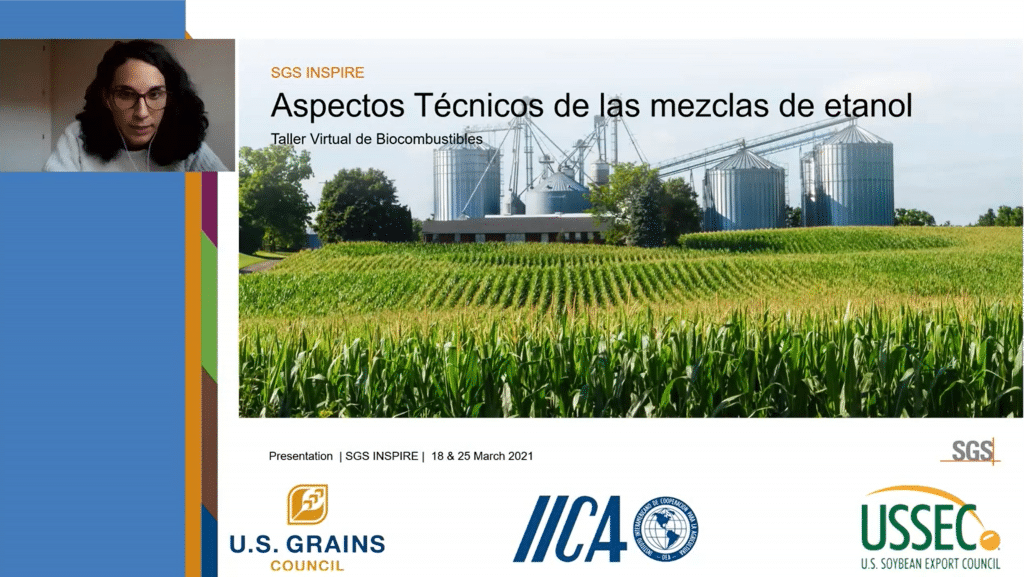Aida Gonzalez Palomino, market analyst, Latin America and Africa at SGS Inspire, covered the technical aspects of ethanol blends during one of the two virtual biofuels workshops offered by the Council in partnership with the Inter-American Institute for Cooperation on Agriculture (IICA) and the U.S. Soybean Export Council (USSEC).
To help unlock opportunity for increased ethanol use in Central America, the U.S. Grains Council (USGC) in partnership with the Inter-American Institute for Cooperation on Agriculture (IICA) and the U.S. Soybean Export Council (USSEC), executed two successful virtual biofuels workshops, hosting more than 80 participants from 10 different Latin American countries, with representation from 44 entities that included ministries of environment, energy, economy and agriculture, technical norms institutes and regulators, as well officials from national oil companies.
“The workshops provided policy makers and regulators from the Central America region and the Caribbean with the tools and knowledge needed to materialize the many benefits that fuel ethanol can provide,” said Carlos Suarez, USGC regional ethanol consultant. “The program successfully showcased the role that biofuels can play in decarbonization, the health and environmental benefits of ethanol blends, and the technical and operational considerations associated to implementing ethanol blending with gasoline. These tools and knowledge are crucial for the Council to be successful in helping governments to establish ethanol policies and blend mandates.”
The two webinars capped off five-week training courses for technical staff and government officials responsible for ethanol blending policies and implementing fuel regulations and included participants from Colombia, Costa Rica, Ecuador, El Salvador, Guatemala, Honduras, Jamaica, Nicaragua, Panamá and the Dominican Republic. The course content allowed participants to round out their knowledge regarding the economic and environmental benefits of ethanol blending with gasoline and allowed participants to better understand the preparations and regulation modifications required for the successful implementation of an ethanol policy. In addition, attendees learned about the carbon intensity of gasoline, the role of biofuels in decarbonization, the health and environmental benefits of ethanol blends and the technical and operational considerations associated to implementing ethanol blending with gasoline.
“This activity supports the Council’s goal to be positioned as a policy and technical reference point regarding ethanol use for government officials in the region. Establishing collaborative relations with the people responsible for developing policies in strategic areas such as energy, environment, fuel regulations, among others, is a key component of the Council’s work to develop markets and enable trade overseas,” Suarez said.
About The U.S. Grains Council
The U.S. Grains Council develops export markets for U.S. barley, corn, sorghum and related products including distiller’s dried grains with solubles (DDGS) and ethanol. With full-time presence in 28 locations, the Council operates programs in more than 50 countries and the European Union. The Council believes exports are vital to global economic development and to U.S. agriculture’s profitability. Detailed information about the Council and its programs is online at www.grains.org.

